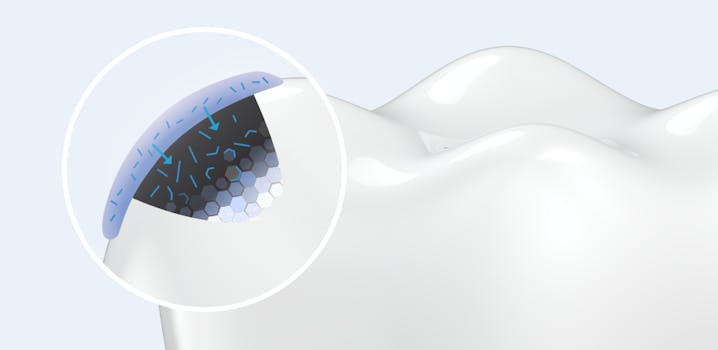What to do if there is a hole in the tooth?
This blog post is all about a topic that concerns us all: tooth decay, also known as a cavity. This common dental disease can not only be painful if left untreated, but can also have far-reaching effects on your overall dental health. But don't worry, we're here to provide you with valuable information and solutions. Find out in this blog post what to do if you discover signs of tooth decay and how you can protect your teeth in the long term.



What is a cavity in a tooth?
A cavity in the tooth, also known as dental caries, is one of the most common dental problems treated in a dental practice. This condition often begins unnoticed and is caused by caries bacteria that convert sugary drinks and food into acids. These acids attack the tooth enamel, a process known as demineralisation, and lead to the formation of small defects or cavities in the tooth.
When the damage penetrates the enamel, it reaches the pulp and leads to dental caries. Without adequate dental hygiene and professional caries treatment, this progressive caries can lead to pain, tooth decay and even the loss of the affected tooth. It is therefore important to visit our ALPINE WHITE Studio regularly to recognise and treat such problems at an early stage.
Development of caries and the involvement of dental tissue
Caries development begins on the tooth surface and can quickly become a serious threat to dental health. At first it appears to be just a small cavity, but without proper treatment, decay can quickly spread and reach the underlying dentin. This deeper tooth tissue is softer and less resistant to the acids produced by harmful bacteria. The bacteria feed on the carbohydrates we consume and, as a by-product of this diet, release acids that attack first the hard enamel and then the softer layers of dentin underneath.
The progressive destruction caused by these acids eventually leads to the caries penetrating deeper into the tooth and reaching the tooth root, which can lead to toothache and inflammation. This more severe form of tooth decay is known as deep caries and requires immediate dental intervention to save the integrity of the tooth and prevent further complications such as tooth loss or extensive infection. In Germany, as in many other countries, great emphasis is therefore placed on preventive dental examinations and treatment by specialists such as Dr med. dent. to effectively manage and treat such advanced caries.
The deposits on the necks of teeth, which are often difficult to access and clean, can also be a breeding ground for tooth decay. It is therefore important not to neglect this area during daily oral hygiene. Regular professional dental cleanings can help to effectively clean such problem areas and prevent the formation of plaque, which could otherwise lead to further cavities.
This emphasises the importance of dental hygiene and regular check-ups at our ALPINE WHITE Studio. If detected early, tooth decay can often be treated much more easily and without major surgery. Early intervention can not only minimise pain and the risk of further spread, but also reduce the need for more complex and costly treatments such as crowns or root canal treatment.
Detection at an early stage
Early detection of caries is also crucial for the preservation of tooth structure. The initial stage of caries, also known as initial caries, is often characterised by its inconspicuousness. With no visible symptoms and no pain, this early form of tooth decay often goes undetected. Some of the first signs may be a slight discolouration or dull spots on the enamel, which are difficult to detect without special dental instruments or techniques.
As the decay progresses, more obvious symptoms develop, including tooth sensitivity, toothache and visible pits or dark spots on the teeth. This progressive deterioration can quickly progress to an advanced stage, requiring more extensive and invasive treatment. In children in particular, attention should be paid to the earliest signs of decay in primary teeth, as these can affect the health of subsequent permanent teeth. Early intervention is particularly valuable here to prevent long-term dental disease.
Oral hygiene and prevention
Excellent oral hygiene is essential for the prevention of tooth decay. This includes regular brushing with a fluoride toothpaste. Fluoride plays a crucial role in the remineralisation of tooth enamel and can help to counteract the early stages of tooth decay. Use our Whitening Toothpastes, these toothpastes contain fluoride. Flossing is also important to remove food debris and plaque from between the teeth, where brushing is often not enough.
Dental hygiene at ALPINE WHITE
Regular professional dental cleaning is essential to monitor the condition of the teeth and to intervene early in the process of caries formation, to remove tartar and to promote the flow of saliva, which has natural cleansing properties and helps to neutralise acids.
In conclusion, avoiding sugary drinks and consistent dental hygiene are the best measures to prevent tooth decay and related complications such as bad breath or dentures. Visit us regularly for dental hygiene and discuss further preventive measures to maintain your dental health and avoid a large cavity in your tooth.


For a healthy mouth and beautiful teeth, regular professional teeth cleaning is essential. Our specialists detect early signs of caries and prevent them.
- Personalised dental hygiene
- Gum check & caries control
- Painless cleaning with AIRFLOW
Treatment options at the dentist
The treatment of dental caries depends heavily on the progress of the disease. In the early stages, a cure can often be achieved with fluoride treatment and remineralisation. With advanced caries, it may be necessary to remove the diseased tissue and seal the tooth with a filling. Materials such as composites or amalgam are used to restore the integrity and function of the tooth. In very severe cases where the tooth nerve is affected, root canal treatment may be necessary and if the tooth is severely damaged, a dental crown may be necessary to save the tooth.
To treat a cavity, your dentist may perform a dental filling or recommend a crown for more extensive damage. Fluoride toothpaste is also often recommended to strengthen teeth and prevent further demineralisation. Good dental hygiene, such as the regular removal of plaque, plays a crucial role in preventing tooth decay and maintaining the health of your gums.
Caries treatment at ALPINE WHITE
At ALPINE WHITE, in addition to oral health checks, bleaching and dental hygiene, we also offer you special treatments in the fight against tooth decay. Find out more in this paragraph.
Caries risk analysis by saliva test
To improve the early detection of caries, our ALPINE WHITE Studios offer an innovative caries risk analysis. This analysis is carried out using a saliva test that makes it possible to assess a customer's individual caries risk. The test analyses the composition of saliva to identify the presence and activity of caries-causing bacteria. In this way, we can recommend preventive measures and intervene at an early stage before the tooth structure is significantly affected.
Caries repair with Curodont Repair
In our Studios, we also rely on the innovative "Caries Repair" treatment concept, which uses Curodont Repair. This method is particularly effective in the treatment and prevention of early stages of caries. Curodont Repair aims to remineralise the enamel and strengthen the teeth's natural resistance to acid attacks. The regenerative effect of the product can effectively stop incipient caries lesions and maintain the integrity of the tooth. The use of Curodont Repair as part of our Caries Repair Programme allows us to intervene early and significantly reduce the development of caries without the need for invasive procedures.
These advanced approaches in the early detection and treatment of tooth decay are crucial to ensure the long-term health of your teeth and minimise invasive dental procedures. Through early detection and preventative treatment, we can ensure that your teeth stay healthy and strong.
Prevention is the best way
At ALPINE WHITE, we believe that the most effective way to avoid tooth decay is through prevention. Our expertise focuses on comprehensive dental care through regular care by specially trained dental hygienists instead of dentists. This allows you to avoid expensive visits to the dentist. We emphasise the importance of a balanced diet and advise you to limit your consumption of sugary drinks and snacks to keep your permanent teeth healthy. By taking these targeted measures, you can not only minimise the risk of tooth decay but also make a decisive contribution to the health of your entire oral cavity. Our dental hygienists will help you develop and maintain optimal oral hygiene practices to keep your teeth and gums healthy.


